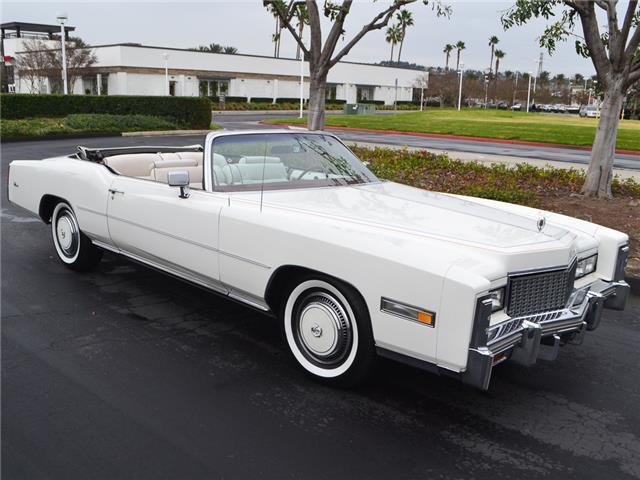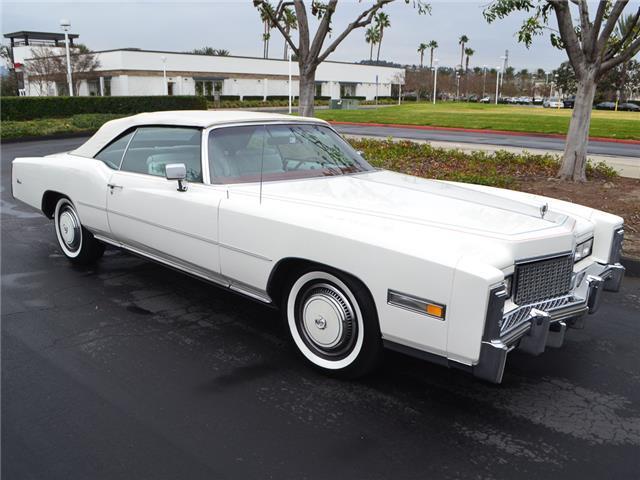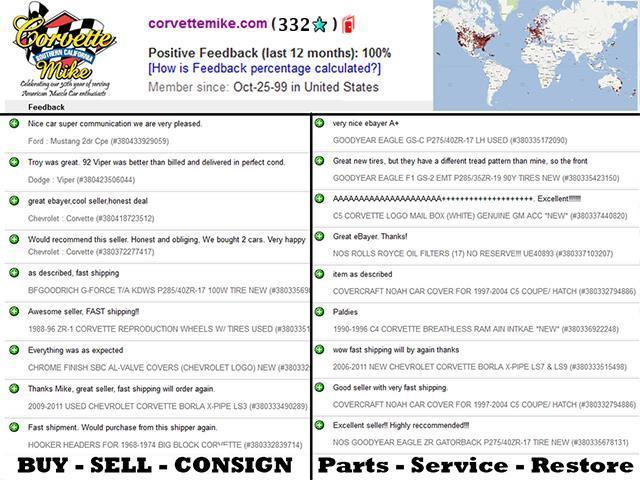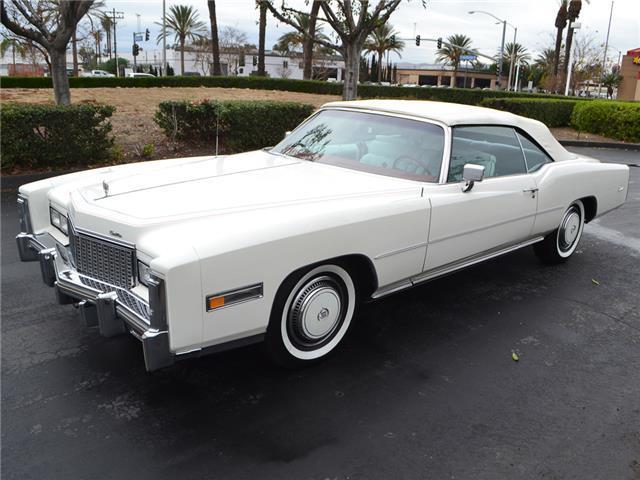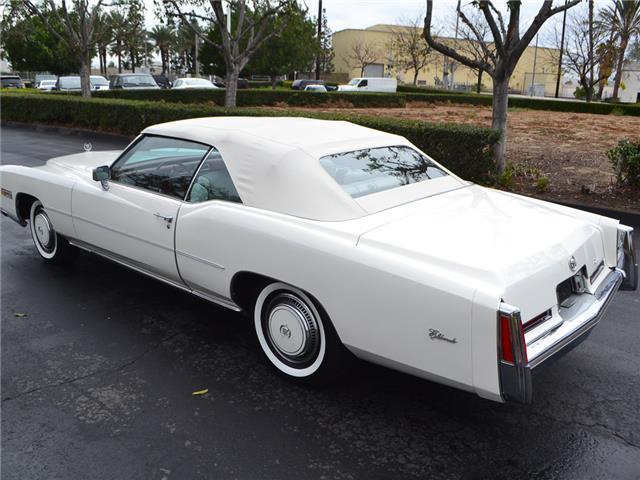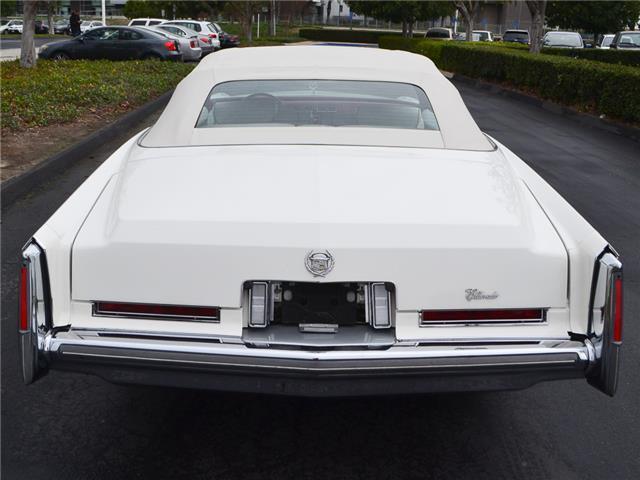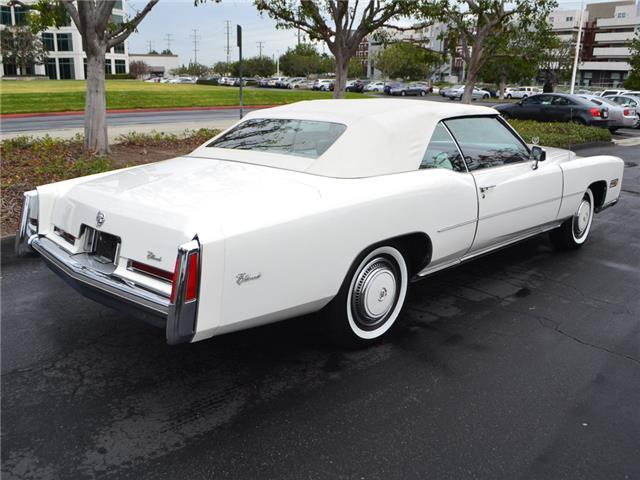1976 Cadillac Eldorado Convertible, Bicentennial Edition, 9k Mikes, #38 of 200
- Location: Anaheim, California, United States
- Condition: Used
- Make: Cadillac
- Model: Eldorado
- SubModel: Convertible
- Type: Convertible
- Trim: Convertible
- Year: 1976
- Mileage: 9,200
- VIN: 6L67S6Q262357
- Color: White
- Engine size: 8.2L V8
- Power options: --
- Fuel: Gasoline
- Transmission: Automatic
- Drive type: Convertible
- Interior color: White
- Options: --
- Vehicle Title: Clear
1976 Cadillac Eldorado Convertible Description
Cotillion White w/White interior with Firethorn piping, dash and carpeting, 8.2L V8, 3-speed. automatic transmission.While much of the U.S. was preparing for the nation’s bicentennial festivities to commence on July 4, 1976, other notable dates were taking place in the months before the big 200th birthday celebration. Wednesday, April 21, 1976, was a sunny spring day in Detroit. A Cotillion White 1976 Cadillac Fleetwood Eldorado was proceeding down the assembly line at Cadillac’s Clar...k Avenue plant, as many convertibles had done in the years before. But this one was different. All along the way, plant workers were posing to have their picture taken with the car. And as it came off the final line shortly after 10:00 AM, Cadillac Motor Car Division General Manager Edward C. Kennard sat behind the wheel, with Manufacturing Manager Bud Brawner, Detroit Mayor Coleman Young, and several Cadillac assembly workers coming along for the ride.What made this particular convertible special was its status as the last production American-made convertible built by a major U.S. auto manufacturer. It was the last of 200 identical “last” models built to commemorate the occasion. At the time, this was big news because of the convertible model—no matter the make or model—was always the model that seemed to depict the American way of life better than any other. And its day had sadly come.The popularity of the convertible body style peaked in the early sixties, then began a rapid descent as more hardtop models were introduced with vinyl tops, factory air conditioning systems, and more elaborate sound systems. Sunroofs were more mainstream by the late sixties, and there was the potential of new roll-over legislation being enacted which would make it too costly to build a convertible model that could meet the standards. All of these things came together to put an end to the convertible body style.The demise of the convertible shouldn’t have been a huge surprise to anyone paying attention, as convertible models had been dropping out of production for years. Luxury convertibles were particularly hard hit, and that happened early on as pampered luxury car buyers were more than willing to give up the glamorous looks of a top-down model for factory air conditioning, stereo radios, a quiet interior environment, and arriving with hairdos intact, no perspiration, and dust-free clothing.The first luxury convertible to go was the Oldsmobile Starfire, which offered its final convertible in 1965, a year before the model itself passed into oblivion after 1966, to make way for the new personal luxury Toronado. The Ford Thunderbird was next, with its last open-air model coming off the line in 1966. Lincoln Continental followed the next year, with its last four-door convertible being made for 1967. Chrysler Corporation’s flagship Imperial model still built a Crown Convertible in 1968, but that was the end of the line for that body style. That left only the Cadillac DeVille to represent the interests of luxury car buyers who still wanted a convertible at that point.Convertibles elsewhere where being discontinued as well. 1969 would be the last year for a Chevrolet Camaro or Pontiac Firebird Convertible. Ford built its last full-sized convertible in 1972, as did Mercury. The Ford Mustang and Mercury Cougar would build their final convertibles in 1973. Chevrolet, Pontiac, Oldsmobile, and Buick would all assemble their final convertibles in 1975. The majority of convertible models dropped out of production in a relatively short period of time, from 1970-1975, just six years.So when Cadillac served notice—rather discreetly at first—that the Eldorado Convertible was the only convertible now built in America, and it would not be repeated for 1977, everyone knew they only had one chance to get a new convertible. Speculators saw an opportunity to profit from this announcement as well. Even Cadillac was a bit shocked when it saw the orders for Eldorado Convertibles escalate to 156 percent of 1975 production. A total of 14,000 Eldorado Convertibles were built for the 1976 model year, and Cadillac likely would have built more if they had been able to obtain more of the necessary components.There were many requests for the actual last convertible to be built. Cadillac had already determined that it would keep the actual last car for its historical collection, so the decision was made to create a trim package of identical last convertibles. Since Cadillac didn’t want to appear to be taking advantage of this situation, the package they created was named the Eldorado Bicentennial Convertible, in recognition of that year’s most significant date. The base price on a 1976 Cadillac Fleetwood Eldorado Convertible was $11,049, and the Last Convertible Replica Decor Package was a mere $85! Only 200 would be built, and of those only 199 would be for sale to the public.The Bicentennial Edition cars are based on regular production models but differ in a number of details. The paint finish was Cotillion White (paint code 11), a color used for many years on Cadillacs. The convertible top is White as well (top code A), as is the Sierra Grain Leather interior. The Dark Firethorn carpeting, instrument panel, steering column, steering wheel, and seat belts are typical of interior trim code 072. The accent stripes on a car with this color combination would likely be Red (code 76A). But this is where the details make the difference. All Bicentennial Editions start out loaded with every available option as standard equipment, including the hard parade boot. Then added to the pkg is a Blue and Red pinstripe, White wheel cover centers, and a gold engraved plaque on the dash just above the glove box door stating that this car is one of the last 200 identical U.S. production Convertibles built.Originally purchased new in Los Angeles, CA, this excellent example has racked up only 9,200 miles since! It comes with tons of factory and maintenance paperwork and has just been serviced and is ready for cruising or parade duty!
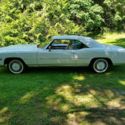 1976 Cadillac Eldorado convertible Bicentennial edition
1976 Cadillac Eldorado convertible Bicentennial edition
Mileage: 1281
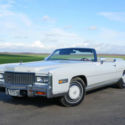 1976 CADILLAC ELDORADO BICENTENNIAL EDITION BODY #13812
1976 CADILLAC ELDORADO BICENTENNIAL EDITION BODY #13812
Mileage: 52,000
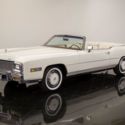 1976 Cadillac Eldorado Bicentennial Convertible
1976 Cadillac Eldorado Bicentennial Convertible
Mileage: 5,433
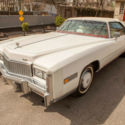 1976 cadillac eldorado convertible Bicentennial Model
1976 cadillac eldorado convertible Bicentennial Model
Mileage: 1959
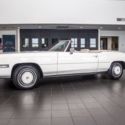 1976 Cadillac Eldorado Fleetwood Bicentennial 1 of 200 29,833 Miles Convertible
1976 Cadillac Eldorado Fleetwood Bicentennial 1 of 200 29,833 Miles Convertible
Mileage: 29,833
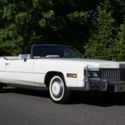 1976 CADILLAC ELDORADO CONVERTIBLE BICENTENNIAL 62 ACTUAL MILES RARE BUY IT NOW
1976 CADILLAC ELDORADO CONVERTIBLE BICENTENNIAL 62 ACTUAL MILES RARE BUY IT NOW
Mileage: 62
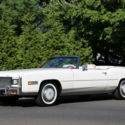 1976 CADILLAC ELDORADO CONVERTIBLE BICENTENNIAL 60 ACTUAL MILES RARE NO RESERVE
1976 CADILLAC ELDORADO CONVERTIBLE BICENTENNIAL 60 ACTUAL MILES RARE NO RESERVE
Mileage: 60
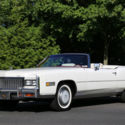 1976 CADILLAC ELDORADO CONVERTIBLE BICENTENNIAL 62 ACTUAL MILES RARE NO RESERVE
1976 CADILLAC ELDORADO CONVERTIBLE BICENTENNIAL 62 ACTUAL MILES RARE NO RESERVE
Mileage: 62
 1976 Cadillac Bicentennial Convertible #182 of 200 Final Collectors edition
1976 Cadillac Bicentennial Convertible #182 of 200 Final Collectors edition
Mileage: 52000
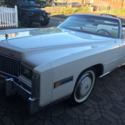 1976 Caddilac Eldorado Bicentennial Edition
1976 Caddilac Eldorado Bicentennial Edition
Mileage: 2,112
